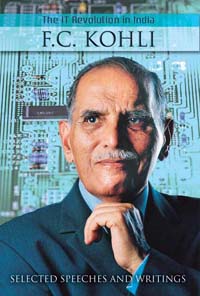Fakir Chand Kohli was overwrought with uncertainties about the future. It was the early seventies and his employers, the Tatas, had asked him to take charge of their fledgling IT company, Tata Consultancy Services or TCS. Kohli had been associated with Tata Electric for over two decades and by his own admission was “a power engineer first”. Tatas were quite keen on Kohli taking charge at TCS due to his technical knack; after all he was instrumental in bringing mainframes in India around 1964 and completely computerising Tata Electric, one of the very few companies globally. Yet, he was not fully convinced.
Finally, his wife Swaran came to his aid and advised him to take up the challenge. Kohli took up the job on one condition that he could return to Tata Electric whenever he wanted to. And the rest as they say is history.
Often referred as the ‘father of Indian IT’ or the ‘Bheeshpithamha’ (grand sire), Kohli modestly  states that these labels do not affect him, though he adds, “I have received lot of respect from people. What more could I have asked for?”
states that these labels do not affect him, though he adds, “I have received lot of respect from people. What more could I have asked for?”
Early days
Born in Peshawar, British India; Kohli completed his graduation from Punjab University. His father ran a renowned department store in Peshawar. “It was one of the biggest in the country named as Kriparam Brothers”. Kohli was part of a large household and was the youngest kid, with 3 brothers and a couple of sisters.
Kohli is a voracious reader and he attributes this habit to his mother. “Though she had studied till standard 8th, she was an avid reader till her death in 1965. She used to read newspapers everyday, and regularly read fiction too. In fact, she maintained a small library that had religious as well as other books. I have inherited that trait from her,” he says.
He also doesn’t fail to add his indebtness to his elder brother, Devraj. “Due to family and personal reasons, he had to leave his education and join our family business. He never forgot that and desired his younger brother to have every opportunity that he could not. What I am today, I owe it all to him,” he says.
Kohli completed his B.A. in English (honors) and B.Sc in Applied Mathematics and Physics. But aren’t literature and applied mathematics at cross with each other? Kohli thunders, “Of course not. Isn’t a beautiful novel constructed on brilliant logic? Take the instance of Dan Brown’s Da Vinci Code…it talks about symbols and aren’t symbols the crux of mathematics?,” he questions.
After his graduation, Kohli applied for a scholarship and went abroad for further studies in 1945, first to Queen’s University, Canada and then his masters in Electrical Engineering from Massachusetts Institute of Technology (MIT), Boston. He returned to India in 1951 for good.
By that time, his family had shifted to Lucknow and he was distraught to see them reduced to such desperate level. “We had to start life all over again. It was a big shock,” he reminisces. “It was a terrible thing (partition) to happen. I just could not fathom how it all happened. We were all so good to each other, so happy,” he adds. Continue reading
